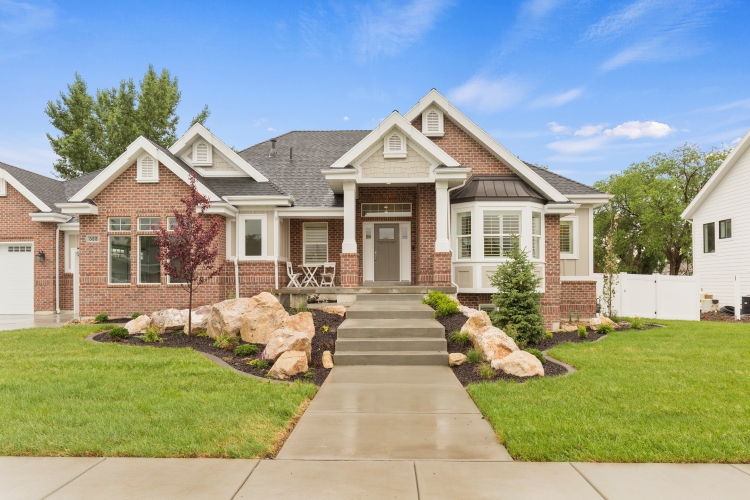Your home: It means so much more to you than just four walls and a roof. It’s a place of comfort and security, family and friends. And it’s likely one of your greatest financial assets. So it’s important to protect those four walls—as well as everything in and around them—with homeowners insurance.
Perhaps, like many homeowners, you bought your current insurance policy when you bought your home, and your coverage has been on “auto pilot” ever since. It’s a smart idea to periodically review not just the protections you have in place, but what you’re paying as well.
Have your costs gone up? Do you pay more than a friend who has a very similar home? Understanding how your rate is calculated can help you determine whether your current coverage is still a good value—and whether there are ways to lower your costs.
How Insurance Companies Determine Your Rate
When you purchase homeowners insurance, insurers ask a number of questions and use your answers to evaluate your risk. Generally, the fewer risk factors you and your home possess, the less expensive your insurance. However, some risk factors can have a bigger impact on how much you pay for coverage than others. The main risk factors fall into three categories: your location, your home, and you.
1. Your Location
Just as location is critical for those buying or selling a home, it’s also an important consideration for insurance companies. Here are some of the features they’ll want to know about your location:
Your Environment. Whether you live in a densely populated urban area or a rural area with few neighbors, there may be hazards specific to your environment that increase your risk factors—and your costs. For example, an urban neighborhood, where homes are built close together, may have greater fire-related risks than a suburban neighborhood.
Your Location’s Claims History. Have you been hit by severe weather, such as a hailstorm or a tornado? Are theft and vandalism more common in your area than across the state? If where you live has a higher incidence of claims, your insurance may cost more. And, if you’re in an area prone to earthquakes or floods, you may even need to purchase separate endorsements or policies specific to these risks.
Your Location’s Fire Protection Rating. This rating is based on how close you are to a fire station. The farther you are from help if there’s a fire, the more you’re likely to pay for insurance— like for example, if you live in an isolated cabin on a mountain.
2. Your Home
To determine your policy rate, insurers will evaluate how much coverage you need. That amount is based on your home’s replacement cost.
Replacement cost is the amount needed to fully rebuild your home on the existing property, in the event of a total loss. That amount can be very different from your home’s market value. Market value is what buyers would be willing to pay for your home. It takes into account the land and any other structures on the property, as well as intangibles like the home’s proximity to bodies of water or good schools, and current market conditions in the area.
To calculate replacement cost, insurers will ask many detailed questions about your home’s structure and features. The age, size and materials that make up your home can all impact its replacement cost. Older homes, for example, can cost more to insure for a couple of reasons. First, there is a higher risk of deterioration and breakdown that would lead to claims. Second, if there is some type of damage, many older homes have architectural or other high-end details that can be costly to repair or replace.
On the other hand, if your home is made of a material like brick, you may be charged a lower rate than owners with comparable homes made from wood, as brick is better able to withstand damage from the elements, such as fire, hail, and wind.
3. You
Just as your personal characteristics affect what you pay for auto insurance, they affect what you pay for homeowners insurance, too. Here are some of the details companies will want to know about you:
Your Personal Claims History. Do you have a pattern of mishaps and small claims? Insurers may determine that you’re more of a risk than someone who has been claim-free for several years—and charge you accordingly.
Your Hobbies and Pets. Pools and trampolines can be a lot of fun, but some insurers consider them “attractive nuisances.” You may pay extra if you have them (although installing fencing or netting may lower that cost), or you may even be declined for coverage. The same is true regarding certain dog breeds. They may be your beloved pet, but to an insurer, they represent greater risk for a dog bite and a liability claim.
Your Credit. It’s not just a factor in qualifying for a mortgage. A good credit score suggests you’re a responsible person, and that may help lower your rate.
A Home-Based Business. If you operate a business out of your home, you may need to insure your equipment or add extra liability coverage if customers visit on a regular basis. Ask your insurer about a special endorsement for home-based businesses. In many cases, these endorsements can be customized to provide just the coverage you need, making them more cost-effective than a separate small business insurance policy.
Are There Ways to Save?
Perhaps you love your home for the very same reasons that insurers view your property as a greater risk—you own a 150-year-old Victorian or you live near the beach, for example. You may be thinking that there’s not much you can do to lower your home insurance costs. But, there are actually many ways to save. Here are a few tips to get you started. You can also talk to your insurance agent or company for additional ideas specific to your situation:
Review Your Coverage. If you can afford it, increase your deductibles. (Remember that there may be separate deductibles for wind, hail, and earthquake). If you haven’t already, consider bundling your home insurance with your auto insurance. This may qualify you for additional discounts at most companies.
Minimize the Risks Associated with Your Location. Look into installing equipment that can help protect you against location-related risks. For example, if you live in “Hurricane Alley,” consider adding storm shutters to your home.
Maintain Your Home; Increase its Safety and Security. If you have an older home, consider updating major components, such as the roof, plumbing and electrical. Homes of any age can benefit from added safety and security features, such as alarms and sprinklers.
Lastly, keep an eye on the fast developing world of smart home technology—devices and systems in a home that can be accessed and controlled using a smart phone. Insurance companies are enthusiastic about how smart home technology can be used to increase the safety and security of a home, as well as help reduce potential losses. A few companies already offer home insurance discounts for adopting smart home technology, and the trend is likely to continue.
Disclaimer: This article is intended to be informational in nature. Please contact your agent or carrier for your specific coverage implications.
KEEP READING: How Moving Affects Your Auto and Home Insurance
![]()







I have a security system from ADT. I also have 3 ring doorbells placed around my property. Do that qualify me for extra discounts.
Hello, Belinda. The Hartford offers discounts for having a security system. At this time, customers are unable to add these discounts online, but you can call in to Home Service at 800-624-5578 and a rep can help you.
We would like a copy of the consumer report. We received the following comments on it.
you applied for credit at a frequency that results in a higher price , low credit limits, low credit card limits,
you opened more accounts than is optimal.
We have been with your company for some time and we have not had any claims on our home owner policies, our credit rate is over 800, we have not been late on any payments to you . We do not feel we are being treated fairly. We have our auto insurance with you also.
I would like someone to review our situation and see if we can not get a lower rate.
We did apply for some minor credit cards such as a lowes card and an Aspen dental card we used for brief time but we paid them off quickly. We do not use credit cards very much.Lowes, Aspen dental and the Goodyear cards were required by the company to get the work done. The interest rate on these cards were 25 -29 percent and we did not feel they were fair and that is why we paid them off and the cards were for those particular instances and were left to expire.
Please review this information and let us know your results.
We now have our American express ($10,000) and Master card($16,000) limits with lower interest which we currently using.
Hi Anthony, please call our customer service department at 1-877-896-9320 and one of our representatives will gladly assist. Thank you.
Do you give a discount on home insurance if I install a monitored alarm system with fire and carbon monoxide alarms.
Grace DelStritto
Hi Grace, we do offer a discount on home insurance if our customers have a security system. If you call our Customer Service Center at 1-800-423-0567, one of our representatives can help you add it to your policy!